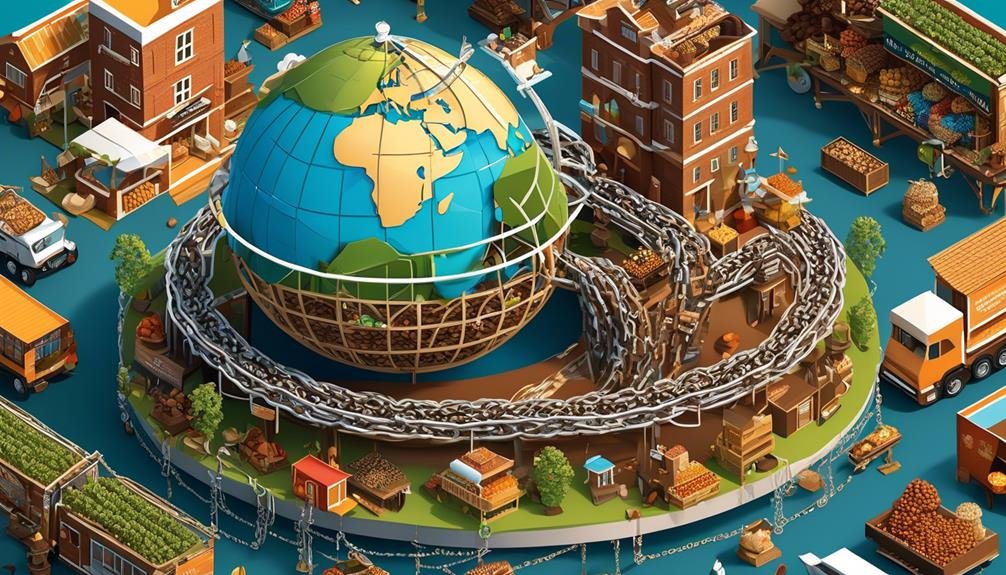Have you ever wondered how fair trade certification works? You see those labels on various products, but what exactly do they mean?
In this discussion, we will explore the ins and outs of fair trade certification, including the role of fair trade organizations, the criteria for certification, the certification process itself, and the benefits it brings to both producers and consumers.
But that's not all – we will also delve into the challenges faced by fair trade certification and what the future holds for this important movement.
Get ready to uncover the secrets behind fair trade certification and discover the impact it has on global trade.
Key Takeaways
- Fair trade certification ensures that farmers and workers are paid fair wages and have safe working conditions.
- Fair trade organizations play a crucial role in establishing and maintaining rigorous standards for certified products.
- The certification process involves evaluating producers or companies for compliance with fair trade standards through on-site visits and document reviews.
- Fair trade certification provides benefits for producers, such as access to international markets, capacity building programs, and social development projects in producer communities.
What Is Fair Trade?
Fair trade is a global movement that aims to promote social and economic justice for producers in developing countries. It's a way of doing business that prioritizes fair wages, safe working conditions, and sustainable practices. When you purchase a product that's certified fair trade, you can be assured that the farmers and workers who produced it were paid a fair price for their labor. This helps to address the economic imbalance that often exists between producers in developing countries and the corporations that buy their goods.
Fair trade also places a strong emphasis on environmental sustainability. Producers are encouraged to adopt environmentally friendly practices, such as organic farming and the use of renewable energy sources. This helps to protect the planet and ensure that future generations will be able to continue to produce and enjoy the products we love.
In addition to these economic and environmental benefits, fair trade also has a social impact. It seeks to empower marginalized producers, particularly women and small-scale farmers, by providing them with opportunities for education and professional development. This helps to build stronger communities and reduce poverty in developing countries.
The Role of Fair Trade Organizations
Fair trade organizations play a crucial role in promoting and ensuring the principles of fair trade are upheld throughout the supply chain. These organizations act as intermediaries between producers in developing countries and consumers in the global market. They work to create a fair and equitable trading system that supports sustainable development and empowers marginalized producers.
Here are three key roles that fair trade organizations fulfill:
- Setting Standards: Fair trade organizations establish and maintain rigorous standards that govern the production, trade, and labor conditions of certified products. These standards encompass social, environmental, and economic criteria, ensuring that producers receive fair prices for their products, have safe working conditions, and operate in an environmentally responsible manner.
- Certification and Monitoring: Fair trade organizations are responsible for certifying products that meet their standards. They conduct regular inspections and audits to ensure compliance. By providing a recognizable label, these organizations help consumers make informed choices and support ethical practices.
- Capacity Building: Fair trade organizations invest in the development of producer communities by providing technical assistance, training, and access to markets. They work closely with producers to improve their skills, knowledge, and productivity, enabling them to compete effectively in the global market.
Through these roles, fair trade organizations play a vital role in promoting fairness, sustainability, and social justice in international trade.
Criteria for Fair Trade Certification
As we shift our focus to the criteria for fair trade certification, it's important to understand the specific requirements that products must meet in order to be recognized as fair trade.
Fair trade certification is awarded to products that adhere to certain social, economic, and environmental standards. Firstly, fair trade products must ensure fair wages and working conditions for farmers and workers involved in the production process. This means that workers should receive a decent living wage and be provided with safe and healthy working conditions.
Additionally, fair trade certification requires that producers have democratic and transparent decision-making processes, allowing workers to have a say in how their organizations are run. Moreover, fair trade products must be produced in a manner that promotes environmental sustainability. This includes responsible use of natural resources, protection of ecosystems, and reduced use of chemicals.
Furthermore, fair trade certification encourages gender equality by supporting women's rights and providing opportunities for women in the workforce. Lastly, fair trade products must also meet quality and safety standards to ensure consumer satisfaction.
The Certification Process
The certification process for fair trade involves a thorough evaluation of products to ensure they meet the required standards. This process is carried out by independent third-party organizations, known as certification bodies, that specialize in fair trade certification.
Here are the key steps involved in the certification process:
- Application: The first step is for the producer or company to apply for fair trade certification. They must provide documentation and information about their production processes, supply chains, and compliance with fair trade principles.
- Evaluation: Once the application is received, the certification body conducts an evaluation of the producer or company. This includes an on-site visit to assess the working conditions, wages, and environmental practices. The certification body also reviews documents such as financial records and contracts to ensure transparency.
- Compliance: If the evaluation shows that the producer or company meets the required fair trade standards, they're granted fair trade certification. They're then allowed to use the fair trade label on their products, indicating to consumers that they've been produced in line with fair trade principles.
The certification process is rigorous and ongoing. Certified producers and companies are subject to regular audits and inspections to ensure continued compliance with fair trade standards. This ensures that fair trade certification maintains its credibility and consumers can trust the products they purchase.
Benefits for Producers
Producers who obtain fair trade certification gain access to a range of significant benefits. Fair trade certification ensures that producers receive fair prices for their products and work under better conditions. Here are some key benefits that producers enjoy:
| Benefits for Producers | Description |
|---|---|
| Fair Prices | Producers receive a minimum price for their products, which helps them cover their production costs and earn a decent income. This stability protects them from volatile market prices. |
| Access to Markets | Fair trade certification opens doors to international markets, allowing producers to reach a wider customer base and increase their sales. |
| Capacity Building | Producers receive training and support to improve their farming techniques, business skills, and organizational capacity. This helps them enhance their productivity, quality, and competitiveness. |
| Environmental Sustainability | Fair trade certification promotes environmentally-friendly practices, such as organic farming and biodiversity conservation. Producers are encouraged to minimize their ecological footprint and protect natural resources. |
| Social Development | Fair trade certification supports social development projects in producer communities, such as building schools, healthcare facilities, and clean water systems. This helps improve the overall well-being of producers and their families. |
Benefits for Consumers
Consumers also benefit greatly from fair trade certification, as it guarantees ethical and sustainable practices throughout the supply chain. When you choose to purchase fair trade certified products, you can enjoy several advantages:
- Assurance of ethical production: Fair trade certification ensures that the products you purchase were made without exploiting workers or violating their rights. This means that the producers receive fair wages, work in safe conditions, and aren't subjected to child labor or discrimination.
- Environmental sustainability: Fair trade certification also prioritizes environmentally friendly practices. This means that the products you buy are produced using methods that minimize harm to the environment, such as reducing the use of harmful chemicals, promoting biodiversity, and conserving natural resources.
- Community development: Fair trade certification supports the development of local communities by promoting social projects, investing in education, healthcare, and infrastructure, and empowering marginalized groups. By choosing fair trade products, you contribute to the improvement of these communities and help create a more equitable world.
Challenges in Fair Trade Certification
One of the key challenges faced in fair trade certification revolves around ensuring transparency in the supply chain. Fair trade aims to create a more equitable trading system for producers in developing countries, but achieving transparency throughout the entire supply chain can be difficult. This is because supply chains can be complex, involving multiple intermediaries and long distances. It becomes challenging to trace the journey of products from the producer to the consumer and ensure that each step meets the fair trade standards.
Another challenge is the cost of fair trade certification. The certification process requires compliance with certain standards, which involves additional expenses for producers. This can be a burden for small-scale producers who may struggle to afford the certification fees. Additionally, fair trade certification often requires ongoing audits and inspections to ensure compliance, which can also be costly for producers.
Furthermore, there can be challenges in educating consumers about the importance of fair trade certification. Many consumers are unaware of the concept or may not understand why they should choose fair trade products. Raising awareness and educating consumers about the benefits of fair trade can be a significant challenge for fair trade organizations.
The Future of Fair Trade Certification
Fair Trade certification is poised to evolve and adapt to meet the changing needs and demands of the global market. As consumers become more aware and conscious of the social and environmental impact of their purchases, Fair Trade certification will continue to play a crucial role in ensuring ethical production and supply chains.
The future of Fair Trade certification looks promising, with several key developments on the horizon:
- Expansion into new industries: While Fair Trade certification has traditionally focused on agricultural products like coffee, cocoa, and bananas, there's a growing interest in expanding certification to other industries such as textiles, electronics, and cosmetics. This will allow consumers to make more ethical choices across a wider range of products.
- Embracing technology: Technology will play a significant role in the future of Fair Trade certification. Blockchain, for example, can provide transparent and traceable supply chains, ensuring that the producers receive fair prices for their goods. Additionally, digital platforms can facilitate direct communication between producers and consumers, fostering a sense of connection and transparency.
- Collaboration and partnerships: Fair Trade organizations are increasingly collaborating with other sustainability initiatives, such as organic and environmental certifications, to create more comprehensive and holistic standards. By working together, these organizations can amplify their impact and promote sustainable practices across various sectors.
Frequently Asked Questions
How Does Fair Trade Certification Impact the Local Economy?
Fair Trade certification positively impacts the local economy by ensuring fair wages and working conditions for producers, promoting sustainable farming practices, and supporting community development projects. This helps create a more equitable and thriving local economy.
Are There Any Limitations or Restrictions on the Types of Products That Can Be Fair Trade Certified?
There are some limitations and restrictions on the types of products that can be fair trade certified. These criteria ensure that the products meet certain social, economic, and environmental standards.
What Measures Are in Place to Ensure That Fair Trade Products Are Truly Benefiting Producers?
To ensure fair trade products truly benefit producers, measures are in place. These include rigorous certification processes, regular audits, and inspections. Additionally, fair trade organizations promote transparency, empowering producers and enabling them to have a say in decisions affecting their businesses.
How Does Fair Trade Certification Promote Sustainability and Environmental Conservation?
Fair trade certification promotes sustainability and environmental conservation by ensuring that producers follow strict guidelines for sustainable farming practices, minimizing the use of harmful chemicals, protecting biodiversity, and promoting the use of renewable resources.
Is Fair Trade Certification Recognized and Accepted Globally, or Does It Vary by Country or Region?
Fair trade certification is globally recognized and accepted, but it may vary by country or region in terms of specific regulations and standards. Understanding these variations is crucial to ensuring fair trade practices and consumer trust.
Conclusion
In conclusion, fair trade certification plays a vital role in ensuring ethical and sustainable practices in global trade. Through the efforts of fair trade organizations, producers are able to receive fair prices for their products and improve their living conditions.
Consumers, on the other hand, benefit from knowing that the products they purchase are made under fair working conditions. However, fair trade certification also faces challenges that need to be addressed for its continued success.
As we move forward, it's important to support and advocate for fair trade to create a more equitable global economy.




